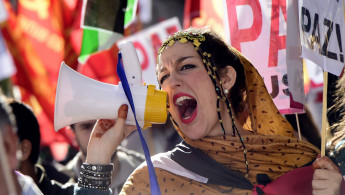Morocco king in controversial visit to disputed Western Sahara
The timing of the visit was chosen to coincide with the 40th anniversary of the Green March.
In November, King Hassan II ordered hundreds of thousands of Moroccans to march into disputed territory in the desert. He wanted to claim the colony of Spanish Sahara for Morocco.
The Green March led to a diplomatic victory for the king, but sparked a guerrilla war and decades of instability in the region
Sovereignty over the Western Sahara has since been disputed between the government of Morocco and the Polisario Front, a Sahrawi rebel national liberation movement working to end Moroccan presence in the Western Sahara and establish an independent nation.
Spain's colonial administration of Western Sahara ended in 1976. Fighting subsequently broke out between Morocco and the Polisario Front.
A ceasefire was reached in September 1991. The UN mission, known as MINURSO, is tasked with monitoring this ceasefire and organizing a referendum on self-determination in Western Sahara.
Morocco has presented a plan for autonomy, while the Polisario Front's position is that the territory's final status should be decided in a referendum on self-determination that includes independence as an option.
 |
|
| The Western Sahara is a highly sensitive subject in Morocco [AFP] |
Peace talks have since stalled, with the Polisario Front threatening to resume hostilities.
The Polisario Front is backed by Morocco's regional rival Algeria.
As the conflict over the future of Western Sahara nears its fortieth year, UN Secretary-General Ban Ki-moon called on all concerned, within the region and the wider international community, to take advantage of the "intensified efforts" of his personal envoy to facilitate the launching of true negotiations in the coming months.
The secretary-general in a statement recalled that the definitive status of this territory is the object of a negotiating process being conducted under his auspices in accordance with the relevant UN Security Council resolutions.
"I note with regret that the April 2007 proposals of the Kingdom of Morocco and the Polisario Front have not opened the way to the genuine negotiations for which the Council and I have repeatedly called," the statement said.
Mr. Ban notes that at his direction, his personal envoy, Christopher Ross, has intensified his efforts to facilitate the entry of the parties into negotiations without preconditions and in good faith to achieve a mutually acceptable political solution, which will provide for the self-determination of the people of Western Sahara.
"They have yet to do so," said the UN chief, adding: "I urge all concerned within the region and within the broader international community to take advantage of my personal envoy's intensified efforts to facilitate the launching of true negotiations in the coming months."
The visit: Political and economic implications
King Mohammed VI will stop in several areas of the Sahara, including the cities of of Laayoune and Dakhla.
The king's second visit to the disputed region since he ascended to the throne is politically very significant, according to experts.
Samir Bennis, diplomatic adviser and Sahara expert close to the government, told al-Araby al-Jadeed's Arabic service: "The king's visit is meant to tell the international community that Morocco will not hesitate to defend its territorial integrity, and that its sovereignty over the Sahara is not subject to compromise or negotiation."
 |
|
| The Sahara is rich in resources such as phosphate [AFP] |
Bennis added: "The king will launch major development projects in the Sahara in conjunction with his visit, to the tune of $16 billion."
"This is in response to claims that Morocco [unfairly] exploits the natural resources of the Sahara and to remove one of the pretexts used by the Polisario Front as well as answer claims of human rights abuse," he added.
Details of the putative projects Bennis alluded to are yet to emerge. The Moroccan government is keeping a tight lid on its plans for the Sahara until the king begins his visit.
Refugee crisis and political detainees
In addition to accusations of profiting from the resource-rich Western Sahara while treating it as a colony, Morocco also stands accused of doing little to address the plight of thousands of Sahrawi refugees forced by the conflict into the Algerian desert, where they still live and depend on international aid, 40 years later.
Morocco has also been accused of engaging in torture, false imprisonment and sexual violence against these refugees.
Meanwhile, Human Rights Watch (HRW) has called Thursday on the Moroccan authorities to free or grant a fair trial to 21 prisoners, including human rights activists, serving jail sentences on the back of violent Western Sahara protests in November 2010.
"The bereaved families of those who lost their lives in November 2010 have a right to see justice done," said Sarah Leah Whitson, Middle East and North Africa director at Human Rights Watch.
"However, justice is surely not done by locking up a group of Sahrawis following a guilty verdict by a military court, based on confessions allegedly obtained under coercion or torture."
Polisario Front responds to visit
Predictably, the king's visit has angered the Polisario Front. Mohamed Abdelaziz, President of the so-called Sahrawi Arab Democratic Republic, declared by Polisario Front in 1976, said the king's visit was a provocative step that violates international legitimacy.
The Polisario Front has filed an official complaint to the UN Envoy for the Sahara Christopher Ross.
The complaint called on the UN to "intervene to stop the visit by the king of Morocco to the Sahara," which the document said is a dangerous escalation that flouts international law and increases tension at a very sensitive time.



